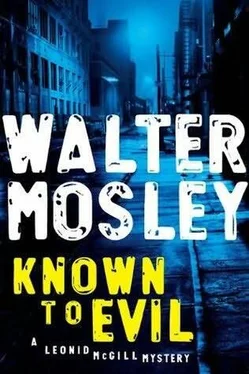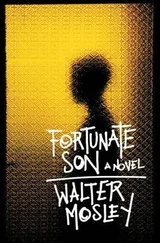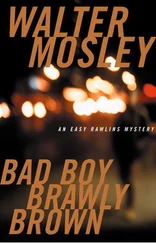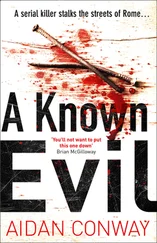"How long?"
There was silence and then the subtle rustling of clothes. I imagined that they were kissing.
"I love you," he whispered.
"Go on to work, John."
"I'll go with you to the train station."
"No."
"Why not? These bags are heavy."
"I'm going to have to get used to carrying them on my own and, and I don't want you to know anything about where I am. This way you won't know if I left by train or bus…"
Or plane, I thought.
"I can't just leave you here," he said.
"Yes you can. Go on now."
That loop in the conversation went on for ten minutes or so. Finally she got him on his feet and shuffling toward the door. Their parting was melodramatic but there was real feeling behind it.
When he was gone I took off the headphones and turned so that I could look upon my unsuspecting client.
SHE SIPPED HER COFFEE and stared ahead. I did the same. I wasn't worried about disease from the used cup. One thing I was certain about-at least most of the time-my death would sneak up on me, a master thief that I'd never see coming.
Seemingly staring off into space, I wondered. One thing I knew for sure about Alphonse Rinaldo was that he expected his instructions to be followed without question or variation. I was not supposed to talk to Angie. Breaking this rule would at the very least sour my relationship with the Big Man.
Yes… definitely… I would be a massive idiot even to entertain such an idea.
"Excuse me, ma'am," I said.
"Yes?" Her smile was immediate and natural.
"Um…" I hesitated, or at least pretended to. "Let me show you my card."
I took out my antediluvian red-brown wallet and produced a card printed with my real name, occupation, address, and office and cell-phone numbers.
She read the information and handed the card back.
"Yes?" she said again.
"I just stopped by here to get some coffee," I said. "I've been working a couple of cases at the same time and needed the stimulus. But it seemed to me that you and your friend were very upset."
Her eyes said that I was right but that she couldn't talk about it. There was an intimacy to this communication that I had expected from the girl.
"I understand," I said. "Here I am, a stranger. But you've read my card. We're both here, living completely different lives…
"I solve people's problems for a living. Before you finish that coffee, you could ask me a question, without giving any details, and I could give you my opinion on the situation."
I could see it in her expression, the unguarded belief that anything could happen. That was why she wasn't suspicious when her rent turned out to be one-third the going rate in Manhattan. In Angie's life good things, like me, just happened.
On the surface it really was a good offer. I had seen the distress in her conversation with John Prince but I couldn't have overheard them. And even if I had, they hadn't said anything that would identify her or her specific problem.
Staring at me, Angie saw a chubby, bald black man in an off-the-rack dark-blue utility suit. I could have been an MTA manager or a door-to-door vacuum cleaner salesman in the old Midwest. I certainly was not a criminal mastermind or anybody who had anything to do with her life up until that moment.
"What if a client came into your office and told you that they had been associated with a crime but they were innocent?"
"I'd ask why they'd come to me rather than go to the police."
This, I could see by her breathing, was the right answer.
"And if they told you that they had done… something, and the circumstances might make her look guilty?"
"I'd say that the police are really very good at their job and that they can usually sort out the innocent from the culpable."
Angie sat back and smiled. It was a real smile, hinting at mirth.
"You don't seem to want to get hired by this woman," she said.
"This is a perfect situation," I replied. "If some rich woman with an emerald necklace and a little lapdog walked into my office I might be more persuasive. But this is just a busman's holiday."
She liked the collegiate language.
"What if I told you the woman in question had been threatened by a man already and when she went to the police they told her to call again if he did something else?"
I sighed and shrugged.
"Yeah," I said. "I'd believe that."
"And then if she told them that men had tried to kidnap her in front of her house but still the police did nothing?"
"Nothing?"
"They came to her place and went through the motions. They said that they'd look into it but never called back. I… she called them, but they never even returned the call."
I sipped my secondhand coffee and wondered. The direction I had imagined for the morning had done a U-turn. I had to choose my words very carefully.
"The main job of the private detective is an emotional one," I said.
"What does that mean?"
"There's an insecurity in the client's life and it's my job to advise them on how to alleviate the anxiety. A cheating spouse or an embezzling employee, it doesn't matter. I have to shed light on the uncertainty. Sometimes the cause is money, and other times it's love."
"There's no love in this situation," Angelique Lear said.
"I can see that."
"So what advice would you give your client?" she asked a stranger.
"That depends on the nature of the criminal situation that this hypothetical client has been drawn into," I said. "If it's a physical crime I'd ask if there was any way that the evidence can point at the client. Could there be any witnesses? Someone who might have seen her, even in passing? Did she touch anything or leave any physical evidence like hair, handwriting, or maybe a bill from some purchase? Like I said, the NYPD can be very efficient. And a serious crime will have a bright light shone on it.
"It might take years, but the wheels of justice do turn and often they catch onto some scrap that the client has left behind."
Angie had to swallow before asking, "And, and if it's not a physical crime?"
"I don't think that's a question in this case."
"Why not?"
"The hypothetical client has been threatened with violence twice. And, if there's no love involved, the crime would almost have to be a physical one."
I waited patiently, wondering where I'd be taken from there while Angie assessed her life along the lines that I had presented.
"So, Mr. McGill," she said at last, "how would you advise your client in this situation?"
"I'd tell her that running was an option but not an easy one. She'd have to change her name and get a new Social Security number. I could give some suggestions along those lines. But I would have to tell her that she'd have to abandon any hope of reconnecting with her former life while living among strangers. And even in this new life she would remain a stranger. She could never tell the truth about her history or upbringing or education. And that young man who just left would never see her again.
"That's what I'd say about long-distance running. But, regardless, she'd have to run for a little while. If I took her on as a client I'd tell her to go to ground for a week or so while I investigated the threats and attempted kidnapping. I wouldn't want to hear about any supposed crime that she might be implicated in. That way I could keep my nose clean if the cops got involved."
"But what good would it do if you couldn't prove that she's innocent of the crime?"
"If the threats and the attack are the cause of the crime, I should be able to prove it-blind, as it were, to the circumstances."
"That seems kind of self-defeating," Angie Lear said.
"Yes, it does," I agreed. "But it protects the client from admitting any involvement with a crime and it shields the detective from prosecution. Later on, if it comes to an interrogation room, or a courtroom, the detective can say that he was simply trying to help a young woman where the authorities had failed. And if the crimes are connected, it will serve to add weight to the client's innocence."
Читать дальше












